|
|
|
Sort Order |
|
|
|
Items / Page
|
|
|
|
|
|
|
| Srl | Item |
| 1 |
ID:
153888


|
|
|
|
|
| Summary/Abstract |
This article examines the potential use of autonomous aerial weapons for targeted killing purposes and, in doing so, looks beyond the now-familiar “global war on terror.” We argue that the combination of novel capabilities with the pre-existing military-theoretical frameworks of advanced Western states, within which autonomous weapons will be embedded, may be conducive to an expansion of targeted killings to scenarios other than military counter-terrorism. The confluence of autonomous weapons and targeted killing practices may therefore lead to a further weakening of long-standing norms regulating the use of force, including in interstate scenarios. We also find that international regulation is unlikely to forestall this outcome, and that political-military insistence on centralized operational control may mitigate—but not negate—the disruptive potential of these developments. As a result, the possible consequences for the international order of an evolution of targeted killing practices along these lines should not be underestimated.
|
|
|
|
|
|
|
|
|
|
|
|
|
|
|
|
| 2 |
ID:
153887
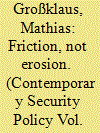

|
|
|
|
|
| Summary/Abstract |
Reframed as “targeted killing,” state-sponsored assassination is moving toward normalization. I maintain that this development can only be understood in the context of long-standing frictions between meta-norms. The regulation of assassination as an instrument of foreign policy is a normative amalgam that is connected to both state sovereignty and liberal thought. Those discursive links structure both the evolution of the norm and its transformation, as they can be invoked by actors in order to reinterpret and reshape it. As I argue, the prevalent “norm erosion” perspective fails to grasp such incremental processes in that it tends to limit its analytical view to single, narrowly defined norms and overemphasizes external shocks. I thus stress the need for a more comprehensive account of normative change that highlights the surrounding meta-norms that are able to connect single norms to their larger position within the international order.
|
|
|
|
|
|
|
|
|
|
|
|
|
|
|
|
| 3 |
ID:
153885
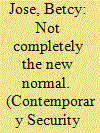

|
|
|
|
|
| Summary/Abstract |
How do human rights groups prevent the normalization of practices they find troubling? Existing international relations research provides insights into how states resist the new norms human rights activists introduce into the global arena. But it tells us less about how governments themselves promote norms and how activists push back against this advocacy. This article explores this issue by examining the interplay between Human Rights Watch (HRW) and the United States around the emerging norm of targeted killing. It argues that Bin Laden’s death opened a window of opportunity for the potential emergence of a targeted killing norm, with the United States as its norm advocate. To prevent its emergence, HRW deployed some of the same strategies states have used to suppress the emergence of norms they dislike. In illustrating these dynamics, this article helps us better understand why some norms rise, why some fall, and why they might change over time.
|
|
|
|
|
|
|
|
|
|
|
|
|
|
|
|
| 4 |
ID:
153889
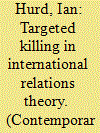

|
|
|
|
|
| Summary/Abstract |
As new technologies make possible new modes of war, they cause tension in the previously prevailing conceptual categories. This is evident, as the practice of targeted killing by governments has increased in frequency and prominence, largely due to the American use of armed drones around the world. The essays in this special issue explore how norms, rules, and laws that many people thought were settled have been roiled by new technologies of targeted killing. This includes rules on sovereignty, territory, due process, and the distinction between civilian and combatant. The essays sketch an implicit research program around the recursive relation between rules and practice. I draw these out into a more general model for scholarship at the boundaries between law and politics and between concepts and practices.
|
|
|
|
|
|
|
|
|
|
|
|
|
|
|
|
| 5 |
ID:
153884
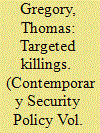

|
|
|
|
|
| Summary/Abstract |
The use of drones to kill suspected militants seems to provide a simple technical fix to a complex ethico-political problem: the need to discriminate between combatants and noncombatants. The technological ability of drones, combined with the rhetorical commitment to reducing civilian casualties, suggests that the principle of noncombatant immunity is firmly entrenched in debates about targeted killings. However, this article will argue that a peculiar effect of this enhanced technological capability has been to draw attention to the conceptual confusion that surrounds the distinction. Rather than assuming that it is a fixed feature of international law, I will argue that it should be viewed as a discursive formation that is contingent upon a precarious process of repetition and reiteration. Moreover, I will show how the laws designed to restrain the violence inflicted on civilian bodies have been invoked to render certain civilians vulnerable, constituting them as killable, their lives profoundly losable.
|
|
|
|
|
|
|
|
|
|
|
|
|
|
|
|
| 6 |
ID:
153876
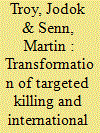

|
|
|
|
|
| Summary/Abstract |
This article introduces the special issue’s question of whether and how the current transformation of targeted killing is transforming the global international order and provides the conceptual ground for the individual contributions to the special issue. It develops a two-dimensional concept of political order and introduces a theoretical framework that conceives the maintenance and transformation of international order as a dynamic interplay between its behavioral dimension in the form of violence and discursive processes and its institutional dimension in the form of ideas, norms, and rules. The article also conceptualizes targeted killing and introduces a typology of targeted-killing acts on the basis of their legal and moral legitimacy. Building on this conceptual groundwork, the article takes stock of the current transformation of targeted killing and summarizes the individual contributions to this special issue.
|
|
|
|
|
|
|
|
|
|
|
|
|
|
|
|
|
|
|
|
|